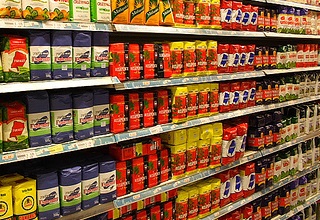Need for national movement on anti-smuggling of food products
Updated: Jul 25, 2014 11:37:53am

This was stated by Secretary, Department of Consumer Affairs, Keshav N Desiraju, speaking at a roundtable organised by FICCI’s Committee against Smuggling and Counterfeiting Activities Destroying the Economy (CASCADE) here yesterday.
The event provided a platform for policy makers, industry and consumer organisations to address smuggling and counterfeiting in food products.
Desiraju said that consumers are allowing the smuggled and counterfeit market in India to flourish due to a lack of awareness of the ill effects of such illegal trade activities, not only on the economy, but more importantly on their safety and health.
Offering his comments, Advisor FICCI CASCADE, P C Jha stated that the costs of counterfeiting and smuggling are not only real, but are huge.
“With the increase in global trade and technological revolution, there has been an increase in commission of crime related to smuggling and counterfeiting. These types of crime have increased considerably, and as a result, the government, businesses, society, and consumers have to suffer heavy financial losses,” he said.
Jha said that protection against such crimes is an important element in encouraging research and innovation, international trade and investment, and sound economic growth and development.
In the FMCG (fast moving consumer goods) industry, the segment that is vulnerable to counterfeiting is the packaged food sector. The smuggled and counterfeit food products business is increasing in India, affecting the health of the consumers. Counterfeiting in this area is particularly dangerous because consumption of non-standard or low quality edible food items may cause serious health ailments or can be life-threatening.
Data shows that counterfeit and smuggled food products are being produced and consumed in virtually all economies, with Asia emerging as the single largest producing region.
Further, in recent years, there has been an alarming expansion of the types of products being infringed, from luxury items to items that have an impact on personal health and safety, like food and drink.
The range of counterfeit and smuggled food products vary from conserved vegetables, milk powder, butter, ghee, baby food, instant coffee, aerated drinks, candy and sweets, hybrid corn seeds, etc. Thus the magnitude and effects of smuggling and counterfeiting on food items are of such significance that they call for strong and sustained action from the governments, business, and consumers.
A recent FICCI CASCADE study stated that in the packaged food sector, the grey market is about 23.4 per cent which results in direct tax loss of Rs 552 crore; Indirect tax loss of Rs 5,108 crore, and thus total loss to the exchequer amounts to Rs 5,660 crore. The sales loss to the industry was reported to be about Rs 20,378 crore.
The roundtable was attended by decision makers from Government, Quasi Government bodies and regulators such as Bureau of Indian Standards, National Test House, Legal Metrology, Consumer Protection Unit, FSSAI; leading industries such as ITC, Marico, Coca Cola, Nestle, HUL, prominent Consumer Organizations such as VOICE, CUTS, CERC and Consumer Online Foundation, who deliberated on specific issues on counterfeiting and smuggling activities in the packaged food sector.
The meeting focused on four product categories, namely, milk and milk products, bakery products + cereals (like ‘atta’), aerated water + mineral water, and edible oil – all food products which have a direct impact on the health and general welfare of consumers.
The roundtable will chart out concrete recommendations and strategies for prevention, mitigation, and management of the problem and will present a paper to the Ministry in a month’s time.
The recommendations would include Focus on rural market- food product of mass consumption; Reinventing the “Jago Grahak Jago” publicity campaign especially with reference to food products; Comparative testing; Class action suits; Structured consumer awareness syllabi for young India; Market surveillance and Industry support and partnership initiatives. (KNN/ES)












